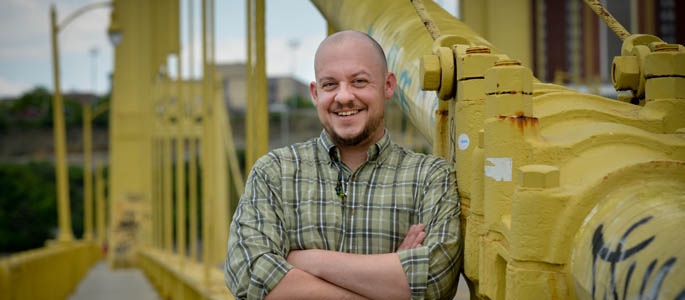Clinical-Community Psychology Grad Classes Help Alum Become a More Empathic Supervisor Thursday, June 2, 2016
Meet Kevin Gallagher
Job titles: Program Supervisor and Part-Time Instructor
Employers: Pittsburgh Mercy's Operation Safety Net and Point Park University
Degrees earned: Master of Arts in Clinical-Community Psychology, 2015, and Master of Business Administration with a concentration in Health Systems Management (August 2016), Point Park University; Bachelor of Arts in Sociology from Indiana University of Pennsylvania, 2007
Grad school activities: Student representative to the executive board of the Society for Humanistic Psychology and founding member of Point Park's chapter of Students for Sensible Drug Policy
Hometown: Canonsburg, Pa.
High school: Canon-McMillan High School
Now living in: Pittsburgh, Pa.
Hobbies/interests: Freelance writing, music (guitar and bass) and film (anything Star Wars related)
Why did you choose Point Park's master's in clinical-community psychology program?
My interest in pursuing a graduate degree was to study approaches to addiction and mental health that were based in a compassionate and accepting way. Instead of focusing on diagnoses and behavior modification, I wanted to learn how to help people help themselves. Point Park's M.A. in clinical-community psychology program allows students an almost radically open space to explore these approaches that many people would consider nontraditional.
Also, the community aspect of this master's program engenders knowledge that human suffering is not always a dispositional or personal issue. It is connected to experiences the person has with outside institutions, including social and environmental systems. When you understand people as they are and begin to understand the systemic and structural issues that influence their lives, it becomes easier to work with people and communities to lessen their suffering.
How have your Point Park classes helped you in your role as a supervisor for Pittsburgh Mercy's Operation Safety Net?
Point Park's approach to psychology has granted me an understanding of human nature that makes me believe leadership is not an act of domination, but of empathy. How can I make decisions for an entire program unless I understand the point of view of the people who work and live there? When you work with people, especially the vulnerable folks Operation Safety Net serves, you have to be open-minded and open-hearted.
As a part-time professor at Point Park, tell us how you incorporate your real-world work experience into your classes.
Right now, I am mainly teaching students who are not part of the Department of Psychology. They may be part of the Conservatory of Performing Arts, an engineering major, or a business major. Sometimes, the last thing on their minds is a required class in sociology or psychology.
However by bringing current issues, including local issues, into class I connect high-minded theories and philosophies with experiences the student, or someone in the student's life, has had. Having spent time with different social service agencies, I have many examples and stories that can shape how and what I teach. My hope is that by doing this, students have a better understanding of how to see life through someone else's eyes.
What's your favorite Point Park grad school memory?
Alumnus Justin Karter and I flew to Chicago to give a presentation at the Annual Conference for the Society for Humanistic Psychology. We were given a much better spot on the schedule than we had expected. It was the 3 p.m. slot on Friday of the conference, right before the big buffet dinner/poster presentation, so the room was packed. As we started giving the presentation, I remember beads of sweat rolling down the back of my head from nerves. Not only were there many new faces in the room, but also we had three of our mentor professors from Point Park in attendance.
We nailed the presentation ("Anarchism and Phenomenology: Derridean Supplements for Social Change") and were told by some attendees that we were their favorite of the conference. Afterward, we went to dinner with Drs. Robert McInerney, Brent Robbins and Matthew Allen from Point Park, and Dr. Louis Hoffman from Saybrook University. Justin and I both felt a great sense of accomplishment and a welcoming from these professors, as we had beaten back our imposter syndrome. That was the highlight of my graduate school career.
What are your career goals?
My goal now is to continue to create and administer community-based mental health and physical health programs while continuing to teach at the collegiate level part time.
What career advice do you have for our psychology students?
Get involved. Whether it's volunteering on campus or with an outside organization that shares your values, get involved. I have learned more and gotten farther with my grounded experiences with people than by reading and writing. Not that reading and writing isn't important, but what is the good of academic endeavors if we never learn how to apply them to the real world?
More About: Canon-McMillan High School, faculty, School of Arts and Sciences, M.A. in clinical-community psychology, alumni


